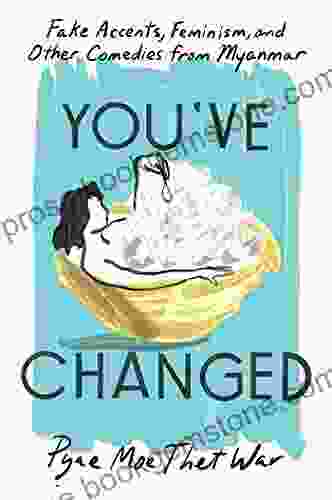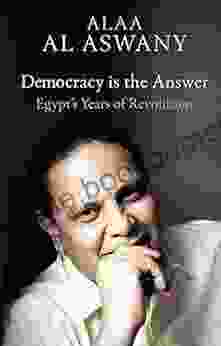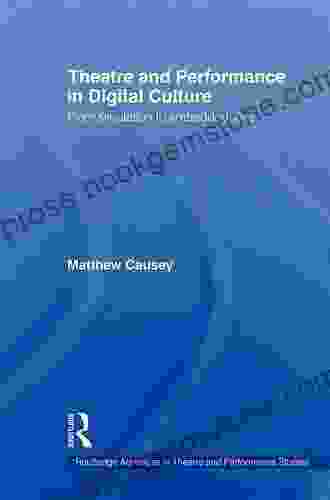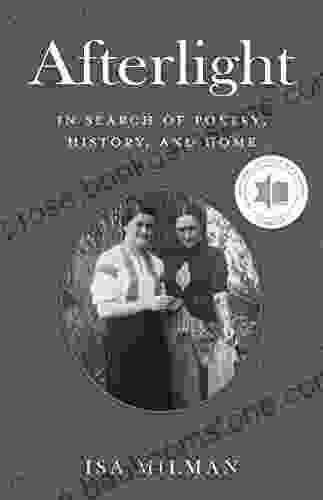Performance Memory: Affect, Embodiment, and the Politics of the Past in Theatre Performance Studies

Performance memory is a complex and multifaceted phenomenon that has been the subject of increasing interest in recent years. This interest is due in part to the growing recognition of the importance of memory in human experience and cognition, as well as the increasing use of performance as a tool for exploring and engaging with the past.
In theatre performance studies, performance memory has been explored in a variety of ways. Scholars have investigated the ways in which performance can be used to preserve and transmit memories of the past, as well as the ways in which performance can be used to challenge and disrupt dominant narratives about the past.
4.6 out of 5
| Language | : | English |
| File size | : | 6179 KB |
| Text-to-Speech | : | Enabled |
| Screen Reader | : | Supported |
| Enhanced typesetting | : | Enabled |
| Word Wise | : | Enabled |
| Print length | : | 134 pages |
This article will provide an overview of the field of performance memory, with a particular focus on the ways in which performance memory has been used to explore the politics of the past. The article will begin by discussing the different ways in which performance can be used to access and represent the past. It will then explore the ways in which performance memory can be used to challenge and disrupt dominant narratives about the past. Finally, the article will consider the ethical and political implications of using performance memory to engage with the past.
Accessing and Representing the Past through Performance
Performance can be used to access and represent the past in a variety of ways. One way is through the use of historical documents and artifacts. By incorporating historical materials into their performances, artists can create works that are directly engaged with the past. For example, the playwright Tony Kushner's play Angels in America (1993) uses historical documents and speeches to explore the AIDS crisis in the United States.
Another way that performance can be used to access and represent the past is through the use of personal narratives. By sharing their own stories and experiences, performers can create works that are deeply personal and resonant. For example, the performer Anna Deavere Smith's play Twilight: Los Angeles, 1992 (1993) is a series of monologues based on interviews with people who were affected by the 1992 Los Angeles riots.
Performance can also be used to access and represent the past through the use of ritual and ceremony. Rituals and ceremonies are often used to commemorate and remember important events from the past. By participating in these rituals and ceremonies, performers can create a sense of connection to the past and to those who came before them. For example, the annual Day of the Dead festival in Mexico is a ritual that allows people to remember and celebrate their deceased loved ones.
Challenging and Disrupting Dominant Narratives about the Past
Performance can also be used to challenge and disrupt dominant narratives about the past. By presenting alternative perspectives and experiences, performers can challenge the ways in which the past has been remembered and represented. For example, the playwright August Wilson's play The Piano Lesson (1990) challenges the dominant narrative about the American South by presenting the lives and experiences of African American characters.
Performance can also be used to disrupt dominant narratives about the past by exposing the gaps and silences in the historical record. By bringing to light stories that have been marginalized or forgotten, performers can challenge the ways in which the past has been shaped and remembered. For example, the playwright Paula Vogel's play The Baltimore Waltz (1996) explores the experiences of women who were institutionalized for mental illness in the early 20th century.
Performance can also be used to disrupt dominant narratives about the past by creating new and alternative ways of remembering and representing the past. By using experimental and innovative performance techniques, artists can challenge the ways in which the past has been traditionally represented. For example, the choreographer William Forsythe's piece In the Middle Somewhat Elevated (1997) uses movement and music to create a new and abstract way of remembering and representing the Holocaust.
The Ethical and Political Implications of Using Performance Memory to Engage with the Past
The use of performance memory to engage with the past has a number of ethical and political implications. One of the most important ethical implications is the need to respect the experiences and memories of those who were affected by the past events being represented. Performers must be careful not to exploit or sensationalize these experiences, and they must always strive to represent them in a way that is respectful and dignified.
Another ethical implication of using performance memory to engage with the past is the need to be aware of the power of performance to shape and influence the way we remember and understand the past. Performers must be careful not to use their power to promote their own agendas or to manipulate the audience's emotions. They must always strive to use their power responsibly and ethically.
The use of performance memory to engage with the past also has a number of political implications. One of the most important political implications is the potential for performance to be used to challenge and disrupt dominant narratives about the past. By presenting alternative perspectives and experiences, performers can challenge the ways in which the past has been remembered and represented. This can be a powerful tool for social and political change.
Another political implication of using performance memory to engage with the past is the potential for performance to create new and alternative ways of remembering and representing the past. By using experimental and innovative performance techniques, artists can challenge the ways in which the past has been traditionally represented. This can help to create a more nuanced and inclusive understanding of the past.
Performance memory is a complex and multifaceted phenomenon that can be used to access and represent the past, to challenge and disrupt dominant narratives about the past, and to create new and alternative ways of remembering and representing the past.
The use of performance memory to engage with the past has a number of ethical and political implications. Performers must be careful to respect the experiences and memories of those who were affected by the past events being represented. They must also be aware of the power of performance to shape and influence the way we remember and understand the past. Finally, performers must use their power responsibly and ethically.
The use of performance memory to engage with the past has the potential to be a powerful tool for social and political change. By presenting alternative perspectives and experiences, performers can challenge the ways in which the past has been remembered and represented. By creating new and alternative ways of remembering and representing the past, performers can help to create a more nuanced and inclusive understanding of the past.
4.6 out of 5
| Language | : | English |
| File size | : | 6179 KB |
| Text-to-Speech | : | Enabled |
| Screen Reader | : | Supported |
| Enhanced typesetting | : | Enabled |
| Word Wise | : | Enabled |
| Print length | : | 134 pages |
Do you want to contribute by writing guest posts on this blog?
Please contact us and send us a resume of previous articles that you have written.
 Best Book
Best Book Page Flip
Page Flip Bookshelf
Bookshelf Literary loom
Literary loom Chapter
Chapter Bookish
Bookish PageTurner
PageTurner Bibliophile
Bibliophile Story
Story Inkwell
Inkwell Bookworm
Bookworm Labyrinth
Labyrinth Plot Twist
Plot Twist Prose
Prose Paperback
Paperback Storyteller
Storyteller Sanctuary
Sanctuary Fiction
Fiction Reading
Reading Chronicle
Chronicle Read
Read Robert Littell
Robert Littell Haytham Al Fiqi
Haytham Al Fiqi Carole Zucker
Carole Zucker Toni Bentley
Toni Bentley Whitney Crothers Dilley
Whitney Crothers Dilley Michael Sragow
Michael Sragow Nicolas Rothwell
Nicolas Rothwell Veronica Lawlor
Veronica Lawlor Laila Ibrahim
Laila Ibrahim Camilla Erickson
Camilla Erickson Maud Guilfoyle
Maud Guilfoyle David Gilmore
David Gilmore Caroline Weber
Caroline Weber Nate Crowley
Nate Crowley Ramin Zahed
Ramin Zahed Ian Olio
Ian Olio Linda Przybyszewski
Linda Przybyszewski The Editors Of New York Magazine
The Editors Of New York Magazine Tanith Lee
Tanith Lee Dan Moren
Dan Moren David Gerrold
David Gerrold Vrasidas Karalis
Vrasidas Karalis Robert Noble Graham
Robert Noble Graham Kevin Winkler
Kevin Winkler Caroline Knapp
Caroline Knapp Ems Publishing
Ems Publishing Lidia Bastianich
Lidia Bastianich Brian Broome
Brian Broome Lily Koppel
Lily Koppel Robert Barr Smith
Robert Barr Smith Marcia Iwatate
Marcia Iwatate N K Jemisin
N K Jemisin M R Forbes
M R Forbes Tosha Lavette
Tosha Lavette Edgardo Cozarinsky
Edgardo Cozarinsky Burton Bernstein
Burton Bernstein John Clites
John Clites Wilder Page
Wilder Page Murry E Page
Murry E Page Brit Bennett
Brit Bennett Eric Henze
Eric Henze Luca Somigli
Luca Somigli Tom Wolfe
Tom Wolfe D J Conway
D J Conway J F Martel
J F Martel Jay Wolf
Jay Wolf Michelle Kuo
Michelle Kuo Parshwika Bhandari
Parshwika Bhandari Rosalind Rosenberg
Rosalind Rosenberg Tim Jeal
Tim Jeal Peter Razor
Peter Razor Mia Black
Mia Black Mateus Batista
Mateus Batista James Mcbride
James Mcbride Marceline Smith
Marceline Smith Casey Diaz
Casey Diaz Sven Lindqvist
Sven Lindqvist Devon C Ford
Devon C Ford Paul Smith
Paul Smith Craig Anderson
Craig Anderson Reyna Grande
Reyna Grande Timon Screech
Timon Screech Dwayne Walker
Dwayne Walker Zora Neale Hurston
Zora Neale Hurston Carlyn Beccia
Carlyn Beccia Julia Sherman
Julia Sherman Griff Hosker
Griff Hosker Camille Laurens
Camille Laurens Brady J Crytzer
Brady J Crytzer Elin Hilderbrand
Elin Hilderbrand Darin Martineau
Darin Martineau Foundation Of Flexographic Technical...
Foundation Of Flexographic Technical... Sallust
Sallust Maturin Murray Ballou
Maturin Murray Ballou Noell K Wolfgram Evans
Noell K Wolfgram Evans Greg Keyes
Greg Keyes Shirish Deshpande
Shirish Deshpande Caseen Gaines
Caseen Gaines Carlos Francisco Jackson
Carlos Francisco Jackson John Muir
John Muir Yumiko Alexander
Yumiko Alexander Cassie Dandridge Selleck
Cassie Dandridge Selleck Terrence K Williams
Terrence K Williams Scott D Smith
Scott D Smith Sarah Garland
Sarah Garland D B Goodin
D B Goodin Bev Sellars
Bev Sellars Brian Smith
Brian Smith Pearl S Buck
Pearl S Buck Charlene Mciver
Charlene Mciver Brette Sember
Brette Sember Carole Robson
Carole Robson Rheni Tauchid
Rheni Tauchid Mike Lyon
Mike Lyon Lee Hammond
Lee Hammond Greater Than A Tourist
Greater Than A Tourist Bob Able
Bob Able Nick Caistor
Nick Caistor Paul Clammer
Paul Clammer Leigh Ann Gale
Leigh Ann Gale Bridget Conor
Bridget Conor Kellee Wynne Conrad
Kellee Wynne Conrad Pete Dunne
Pete Dunne Sharon C Cooper
Sharon C Cooper Carsten Wieland
Carsten Wieland Remco Ensel
Remco Ensel Janice Seto
Janice Seto Marge Piercy
Marge Piercy K Wan
K Wan Sara Alm
Sara Alm C White Foss
C White Foss Catherynne M Valente
Catherynne M Valente Charles Earl Bradbury
Charles Earl Bradbury Frances Mayes
Frances Mayes Milo James Fowler
Milo James Fowler Mark Greenside
Mark Greenside C Gockel
C Gockel Brandon Q Morris
Brandon Q Morris J R Grey
J R Grey Liron Yanconsky
Liron Yanconsky Ednor Therriault
Ednor Therriault Jack Vance
Jack Vance Michael Moon
Michael Moon Cathie Ruggie Saunders
Cathie Ruggie Saunders Caroline Johnson
Caroline Johnson C J Cherryh
C J Cherryh Brian D Meeks
Brian D Meeks Carol A Krejci
Carol A Krejci John Campbell
John Campbell Charles Kenney
Charles Kenney Yuwanda Black
Yuwanda Black Tony Bartelme
Tony Bartelme Tom Segev
Tom Segev Bruce Schoenfeld
Bruce Schoenfeld June Foray
June Foray Vicki Zoradi
Vicki Zoradi Mimi Robinson
Mimi Robinson Mandy Pattullo
Mandy Pattullo Thomas Kinkade
Thomas Kinkade Camilla Townsend
Camilla Townsend Relaxed Venues
Relaxed Venues Caitlyn O Leary
Caitlyn O Leary Shane Lochlann Black
Shane Lochlann Black Tom Bergeron
Tom Bergeron Dawn Prince Hughes
Dawn Prince Hughes Capt Ron Nielsen
Capt Ron Nielsen William Matson
William Matson Brian C Baer
Brian C Baer Gabriel Weisz Carrington
Gabriel Weisz Carrington Brian Ladd
Brian Ladd Madeleine L Engle
Madeleine L Engle Kate Schelter
Kate Schelter Leanne Howe
Leanne Howe Eddie Jaku
Eddie Jaku Rick Cheadle
Rick Cheadle Peter Mutabazi
Peter Mutabazi Camelia Elias
Camelia Elias Kamal Saleem
Kamal Saleem Jan Grue
Jan Grue Carole S Kessner
Carole S Kessner David H Levy
David H Levy Booker T Washington
Booker T Washington Brian Herbert
Brian Herbert Michael Lent
Michael Lent James O Reilly
James O Reilly Caroline Self
Caroline Self Jared Blando
Jared Blando Scaachi Koul
Scaachi Koul Carmen Reid
Carmen Reid Gretchen Rubin
Gretchen Rubin Brando Skyhorse
Brando Skyhorse Russell Harris
Russell Harris Kimolisa Mings
Kimolisa Mings Kateri Ewing
Kateri Ewing Carly Murden
Carly Murden James Steffen
James Steffen Vladimir Geroimenko
Vladimir Geroimenko Bruce Ansley
Bruce Ansley Dolly Parton
Dolly Parton Norberto Chaves
Norberto Chaves John Berger
John Berger Elise Young
Elise Young Mary C Olson
Mary C Olson Steven V Roberts
Steven V Roberts Jane Urquhart
Jane Urquhart Tod Polson
Tod Polson J C Moore
J C Moore Carolyn Schulz
Carolyn Schulz Leo Buijs
Leo Buijs Jake Jackson
Jake Jackson Caitlin Starling
Caitlin Starling Dl Acken
Dl Acken Gretchen M Baker
Gretchen M Baker Joe Ide
Joe Ide Brian Seidman
Brian Seidman Gene H Bell Villada
Gene H Bell Villada Carol Berry
Carol Berry Lauren Kessler
Lauren Kessler Lisa Fenn
Lisa Fenn Gaston Migeon
Gaston Migeon Bryan Miles
Bryan Miles Kimi Cunningham Grant
Kimi Cunningham Grant Erik Stafford
Erik Stafford Brendan Nuenfeldt
Brendan Nuenfeldt Wayne Mardle
Wayne Mardle Virginia Hein
Virginia Hein Iris Scott
Iris Scott Jennine Capo Crucet
Jennine Capo Crucet Cheryl Burke
Cheryl Burke Brenda Jackson
Brenda Jackson Bruce T Batchelor
Bruce T Batchelor Scott David Plumlee
Scott David Plumlee Herbie J Pilato
Herbie J Pilato Brittany K Barnett
Brittany K Barnett Carolyn Porter
Carolyn Porter Brian Ashcraft
Brian Ashcraft Claudia Romo Edelman
Claudia Romo Edelman Robert Egan
Robert Egan Rabbi Lynnda Targan
Rabbi Lynnda Targan Joe R Frinzi
Joe R Frinzi C J Box
C J Box Tim Hannigan
Tim Hannigan Mario Puzo
Mario Puzo Stephen Kohler
Stephen Kohler Vanessa Riley
Vanessa Riley Cathy Johnson
Cathy Johnson Burst Books
Burst Books C Carr
C Carr C T Rwizi
C T Rwizi Karyn Langhorne Folan
Karyn Langhorne Folan Sterling Edwards
Sterling Edwards Bryce W James
Bryce W James Lynn Gilbert
Lynn Gilbert Howard Schultz
Howard Schultz Bryon Macwilliams
Bryon Macwilliams Lacy Crawford
Lacy Crawford Inc Complex Media
Inc Complex Media Jillian Vose
Jillian Vose C H Duryea
C H Duryea Brian Borgford
Brian Borgford S C Eston
S C Eston David L Sloan
David L Sloan Francene Hart
Francene Hart Richard Mayhew
Richard Mayhew John Waters
John Waters James Graham Baker
James Graham Baker Rodolphe Lasnes
Rodolphe Lasnes Mira Jacob
Mira Jacob Mynor Schult
Mynor Schult Bridget Quinn
Bridget Quinn Lincoln Cushing
Lincoln Cushing Liane Grunberg Wakabayashi
Liane Grunberg Wakabayashi William Hogarth
William Hogarth Terry Galloway
Terry Galloway Shaku Atre
Shaku Atre Taniece
Taniece Miles J Unger
Miles J Unger Kevina Hopkins
Kevina Hopkins Jennifer Smith Turner
Jennifer Smith Turner Mike Watt
Mike Watt James N Yamazaki
James N Yamazaki Maria Holderbaum
Maria Holderbaum Brian Dougherty
Brian Dougherty Brian Dickinson
Brian Dickinson Victoria Smith
Victoria Smith Karl Fulves
Karl Fulves Tao Wong
Tao Wong Mark Allen
Mark Allen Catherine Kerrison
Catherine Kerrison Brooke Hayward
Brooke Hayward Guy Haley
Guy Haley Polly Evans
Polly Evans K G Crawford
K G Crawford Sheri S Tepper
Sheri S Tepper Bruce Sutherland
Bruce Sutherland Tiffanie Didonato
Tiffanie Didonato Darla Mayberry
Darla Mayberry Donald Keene
Donald Keene Olivia De Havilland
Olivia De Havilland Chris Willis
Chris Willis Eric Walters
Eric Walters Carolyn Brown
Carolyn Brown Bruce Bradley
Bruce Bradley Jack L Roberts
Jack L Roberts Bradford Pearson
Bradford Pearson Sister Dang Nghiem
Sister Dang Nghiem Justin Spizman
Justin Spizman Peter Moruzzi
Peter Moruzzi Judith Heumann
Judith Heumann Donna Digiuseppe
Donna Digiuseppe Marie Arana
Marie Arana Carole Angier
Carole Angier Kate Furnivall
Kate Furnivall Brandon Webb
Brandon Webb Deborah Ball
Deborah Ball Simon Loxley
Simon Loxley Mark Lewis
Mark Lewis Carrie Cariello
Carrie Cariello Carla L Peterson
Carla L Peterson Carrie Fisher
Carrie Fisher Tom Hayden
Tom Hayden Sean Adams
Sean Adams Vladimir Sorokin
Vladimir Sorokin Kelly Sheldrick
Kelly Sheldrick Bruce Baird
Bruce Baird Mineko Iwasaki
Mineko Iwasaki Stephanie Elizondo Griest
Stephanie Elizondo Griest Keisha J
Keisha J Connie Fleenor
Connie Fleenor Daphne Jenkins Sheldrick
Daphne Jenkins Sheldrick Cal Patch
Cal Patch Eric Shanes
Eric Shanes Jeffrey Ross
Jeffrey Ross Carole Massey
Carole Massey Robert L Forward
Robert L Forward Dennis Tupicoff
Dennis Tupicoff Lincoln Child
Lincoln Child Troy Howarth
Troy Howarth Eve Laplante
Eve Laplante Suzette D Harrison
Suzette D Harrison Pyae Moe Thet War
Pyae Moe Thet War Didier Ghez
Didier Ghez Robin Capon
Robin Capon Carolyn Birrell
Carolyn Birrell Drmw
Drmw Josh Malerman
Josh Malerman Brian Evans
Brian Evans Danielle Bernstein
Danielle Bernstein Rachel Felder
Rachel Felder Jenny Lawson
Jenny Lawson Roberto Sandorez
Roberto Sandorez Toni Braxton
Toni Braxton C Shortt
C Shortt Gary Chandler
Gary Chandler Janet Whittle
Janet Whittle Brooke Rundle
Brooke Rundle Carol Bolt
Carol Bolt Kirsten Pai Buick
Kirsten Pai Buick Tasha Black
Tasha Black Tara M Stringfellow
Tara M Stringfellow Dianne Hales
Dianne Hales Mark Leonard
Mark Leonard Marilyn Ann Moss
Marilyn Ann Moss Mary Stuart
Mary Stuart Heriberto Padilla
Heriberto Padilla Ken Lozito
Ken Lozito Paul Reps
Paul Reps Bruce Kennett
Bruce Kennett Perry Buck
Perry Buck S K Dunstall
S K Dunstall Robin Hobb
Robin Hobb Carolyn Han
Carolyn Han Carolina Rose
Carolina Rose Timothy Zahn
Timothy Zahn Karma Waltonen
Karma Waltonen Marji Hill
Marji Hill Brian Hicks
Brian Hicks Magnus Reid
Magnus Reid Byron Comstock
Byron Comstock Eric Bravo
Eric Bravo Gerald M Kilby
Gerald M Kilby D L Young
D L Young Victor Manibo
Victor Manibo Mike Jack Stoumbos
Mike Jack Stoumbos Susan Kennedy
Susan Kennedy Sudhir Hazareesingh
Sudhir Hazareesingh Joshua Slocum
Joshua Slocum Katie Douglas
Katie Douglas Kelsey Oseid
Kelsey Oseid Catherine Gill
Catherine Gill Linda Grant
Linda Grant Dessy Tsolova
Dessy Tsolova Jennifer Julie Miller
Jennifer Julie Miller Dana Mahan Jr
Dana Mahan Jr Kellie Stafford
Kellie Stafford C M Carney
C M Carney William T Vollmann
William T Vollmann Joe Palermo
Joe Palermo C S Leaf
C S Leaf Johnnie Gentle
Johnnie Gentle Carl E Schorske
Carl E Schorske Bell Hooks
Bell Hooks Brittney Brooke
Brittney Brooke John Logan
John Logan Gerald S Strober
Gerald S Strober Russell Maddicks
Russell Maddicks Niobia Bryant
Niobia Bryant Caren Schnur Neile
Caren Schnur Neile Laylah Roberts
Laylah Roberts Elsa Sjunneson
Elsa Sjunneson Carol Miller
Carol Miller Dean Foster
Dean Foster Kathleen Mccormack
Kathleen Mccormack Brooke Barbier
Brooke Barbier Max Vance
Max Vance Jennifer Niven
Jennifer Niven Matt Brown
Matt Brown Joel Shepherd
Joel Shepherd Scott Finazzo
Scott Finazzo Marcos Enrique Ruiz Rivero Ii Aviel
Marcos Enrique Ruiz Rivero Ii Aviel David Crow
David Crow Eric Grzymkowski
Eric Grzymkowski Ernesto Mallo
Ernesto Mallo David Steffen
David Steffen Butch Hartman
Butch Hartman Oliver La Farge
Oliver La Farge Suzanne Woods Fisher
Suzanne Woods Fisher Janice Oberding
Janice Oberding Tad Crawford
Tad Crawford Carmen Sheldon
Carmen Sheldon Rafael De Grenade
Rafael De Grenade Peter Cawdron
Peter Cawdron Bwwm Love
Bwwm Love Sarah Jane Downing
Sarah Jane Downing Walter Mosley
Walter Mosley Brian Wright Mcleod
Brian Wright Mcleod Michael Jacobs
Michael Jacobs David Ryan
David Ryan George R R Martin
George R R Martin Niall Williams
Niall Williams Briar Levit
Briar Levit Mikhail Uspensky
Mikhail Uspensky Lisa Colozza Cocca
Lisa Colozza Cocca Carl Hiaasen
Carl Hiaasen Breeze Holding The Moon
Breeze Holding The Moon Jonathan Raban
Jonathan Raban Keith Mccloskey
Keith Mccloskey Jason Diamond
Jason Diamond Michael Frary
Michael Frary W E B Du Bois
W E B Du Bois H Peter Alesso
H Peter Alesso Olivia Riley
Olivia Riley Thomas S Abler
Thomas S Abler Mara Jaye
Mara Jaye Nikqua
Nikqua Kris Timken
Kris Timken C V Walter
C V Walter Candy Moore
Candy Moore Emiko Ohnuki Tierney
Emiko Ohnuki Tierney Bruce Spydar
Bruce Spydar Brontez Purnell
Brontez Purnell Emily Sturgill
Emily Sturgill Robert Lamouroux
Robert Lamouroux Robbie Freeman Shugart
Robbie Freeman Shugart Ken Steele
Ken Steele R Annie Gough
R Annie Gough Brandi Rarus
Brandi Rarus Mindy Lighthipe
Mindy Lighthipe Kate Fullagar
Kate Fullagar Stuart Kendall
Stuart Kendall Tananarive Due
Tananarive Due Yolanda Hadid
Yolanda Hadid J T Skye
J T Skye Sandy Allison
Sandy Allison Sara Rudin
Sara Rudin Mark Dawson
Mark Dawson Margarida Araya
Margarida Araya Emiko Yamamoto
Emiko Yamamoto Peggy Dean
Peggy Dean Jason Anspach
Jason Anspach David Sayers
David Sayers Brian C Hailes
Brian C Hailes Jacques Vankirk
Jacques Vankirk Ben Box
Ben Box Bob Elliott
Bob Elliott Tj Silverlake
Tj Silverlake Michael Bierut
Michael Bierut Sabeeha Rehman
Sabeeha Rehman Paul E Fallon
Paul E Fallon Cain Carroll
Cain Carroll Daniel Arenson
Daniel Arenson Maurice Broaddus
Maurice Broaddus Carter Hasegawa
Carter Hasegawa Dave Pelzer
Dave Pelzer Frederick Joseph
Frederick Joseph Ilhan Omar
Ilhan Omar Jenny Volvovski
Jenny Volvovski Gary Gibson
Gary Gibson Catherine Craft
Catherine Craft J A Fielding
J A Fielding Carol Wood
Carol Wood Meena Alexander
Meena Alexander Howard Beckerman
Howard Beckerman Carrol L Henderson
Carrol L Henderson D Dauphinee
D Dauphinee John Wagner
John Wagner Dan X Solo
Dan X Solo Chronicle Books
Chronicle Books Graham Mackintosh
Graham Mackintosh Ella Maven
Ella Maven Michael Hingson
Michael Hingson Rachael Lynn
Rachael Lynn Brendan Keogh
Brendan Keogh George Alec Effinger
George Alec Effinger Melissa R Klapper
Melissa R Klapper Michelle Burford
Michelle Burford Kimberlee Yolanda Williams
Kimberlee Yolanda Williams Caroline Scott
Caroline Scott Eufrasia Gagliardo
Eufrasia Gagliardo Brian Seibert
Brian Seibert G L Carriger
G L Carriger Maya Jasanoff
Maya Jasanoff Joan See
Joan See Mark Arnold
Mark Arnold Lyn Wilkerson
Lyn Wilkerson Jenifer Ringer
Jenifer Ringer Clayton Graham
Clayton Graham Delaney Diamond
Delaney Diamond Mike Gayle
Mike Gayle Jasmine Tritten Llc
Jasmine Tritten Llc S J A Turney
S J A Turney Hugh Leach
Hugh Leach Carl Weber
Carl Weber Bill Plympton
Bill Plympton Mz Creates
Mz Creates Renee Rose
Renee Rose Vaughn Heppner
Vaughn Heppner Sarah Spencer
Sarah Spencer Christy Brown
Christy Brown Jill Winch
Jill Winch Brittney C Cooper
Brittney C Cooper Carolyn J Brown
Carolyn J Brown James Tate Hill
James Tate Hill Dave Walsh
Dave Walsh Cale Plamann
Cale Plamann Brandon Massey
Brandon Massey Cat Seto
Cat Seto Daniel J Sharfstein
Daniel J Sharfstein Shaun King
Shaun King Brad Leone
Brad Leone Diana Somerville
Diana Somerville Carrie Summers
Carrie Summers David Kalat
David Kalat Elayne Silva Reyna
Elayne Silva Reyna Carol Belanger Grafton
Carol Belanger Grafton Gail Grant
Gail Grant Jennie Batchelor
Jennie Batchelor Isa Milman
Isa Milman Tanya Lapointe
Tanya Lapointe Jerry Remy
Jerry Remy Zitkala Sa
Zitkala Sa Tamar Arslanian
Tamar Arslanian Paul Chiasson
Paul Chiasson Kelly Kordes Anton
Kelly Kordes Anton Scott Hughey
Scott Hughey Catherine Porter
Catherine Porter Stephen Mertz
Stephen Mertz Buie Harwood
Buie Harwood Brien Foerster
Brien Foerster Kai Kupferschmidt
Kai Kupferschmidt Constantin Step
Constantin Step Lucy R Lippard
Lucy R Lippard C B Griesbach
C B Griesbach Brian Harker
Brian Harker Jesse Leon
Jesse Leon Peter Rhee
Peter Rhee Lonely Planet
Lonely Planet Caterine Milinaire
Caterine Milinaire Kay Bratt
Kay Bratt Mark Wandrey
Mark Wandrey Sonia Cheadle
Sonia Cheadle Bradford Bates
Bradford Bates Susan Hill
Susan Hill Nate Staniforth
Nate Staniforth Brenda Ferguson Hodges
Brenda Ferguson Hodges Parvati Sharma
Parvati Sharma Brian Lawrenson
Brian Lawrenson
Light bulbAdvertise smarter! Our strategic ad space ensures maximum exposure. Reserve your spot today!

 Julio CortázarGolden Poppies: A Mesmerizing Novel that Explores the Power of Love, War, and...
Julio CortázarGolden Poppies: A Mesmerizing Novel that Explores the Power of Love, War, and...
 Edgar CoxFake Accents, Feminism, and Other Comedies from Myanmar: Exploring the Female...
Edgar CoxFake Accents, Feminism, and Other Comedies from Myanmar: Exploring the Female... Bill GrantFollow ·6.4k
Bill GrantFollow ·6.4k Chad PriceFollow ·3.3k
Chad PriceFollow ·3.3k Dylan HayesFollow ·10.9k
Dylan HayesFollow ·10.9k Caleb CarterFollow ·4.7k
Caleb CarterFollow ·4.7k Donald WardFollow ·3.5k
Donald WardFollow ·3.5k Alvin BellFollow ·16.2k
Alvin BellFollow ·16.2k Ibrahim BlairFollow ·9.6k
Ibrahim BlairFollow ·9.6k Gabriel BlairFollow ·11.2k
Gabriel BlairFollow ·11.2k

 Tony Carter
Tony CarterEgypt's Years of Revolution: A Journey Through Tumultuous...
Egypt, a nation steeped in...
4.6 out of 5
| Language | : | English |
| File size | : | 6179 KB |
| Text-to-Speech | : | Enabled |
| Screen Reader | : | Supported |
| Enhanced typesetting | : | Enabled |
| Word Wise | : | Enabled |
| Print length | : | 134 pages |


















